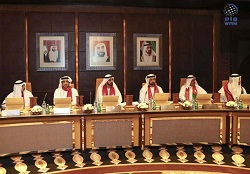Media Center
Mohammed bin Rashid adds tolerance to strategy for national identity, #UAE_Commemoration_Day
The UAE’s national events are an annual occasion for all of us to teach our young generations to love the UAE and to be dedicated to their country and its prosperity, affirmed His Highness Sheikh Mohammed bin Rashid Al Maktoum, Vice President and Prime Minister of the UAE and Ruler of Dubai, while he presided over a Cabinet meeting during which he added tolerance as a fifth key pillar to a five-year strategic plan for national identity.
"Under the leadership of President His Highness Sheikh Khalifa bin Zayed Al Nahyan, we continue with our mission, abiding by the values of hard work and loyalty," H.H. Sheikh Mohammed continued, lauding the President’s efforts to ensure the continued development of the UAE and the prosperity of its people.
The meeting, held at the Presidential Palace, comes just ahead of UAE Commemoration Day and the 45th UAE National Day celebrations, was attended by H.H. Sheikh Mansour bin Zayed Al Nahyan, Deputy Prime Minister and Minister of Presidential Affairs.
"Commemoration Day is a day for the leadership to affirm its commitment and loyalty to the people of the UAE," H.H. Sheikh Mohammed noted, "It is a day to immortalise the sacrifices of our heroes, and to honour their devotion in heeding the call of duty. They are role models and a source for inspiration to our sons and daughters. Tomorrow, we stand united in prayer, honouring the sacrifices of our heroes and celebrating the achievements of our great nation – the achievements they gave their lives to protect," said H.H. Sheikh Mohammed, calling on all members of the UAE community to come together in celebrating Commemoration Day," Sheikh Mohammed bin Rashid said.
During the meeting, the cabinet reviewed the Strategic Plan 2016-2021 for National Identity, which, overseen by the Ministry of Culture and Knowledge Development, seeks to preserve the structure, cohesion, and cultural heritage of Emirati society. The strategy reiterates the values of patriotism and loyalty to the country’s leadership, as established by the Founding Fathers.
The plan comprises four key pillars, as well as 26 initiatives to achieve them. The first of the four pillars seeks to enforce the nation’s value system, while the second doubles down on the values of patriotism and national belonging. The third pillar, meanwhile, underlines the UAE’s shared cultural identity, and the fourth and final pillar evokes the country’s heritage and national symbols.
H.H. Sheikh Mohammed gave directions to add a fifth pillar on tolerance so the pillars in general resonate with the UAE Vision 2021, which aims to make the UAE "one of the best countries in the world" by 2021 and eyes a "cohesive society and preserved identity".
The cabinet also ratified a strategic partnership agreement between the UAE and the Republic of India, which aims to bolster the strategic relations between the two countries, and to promote mutual dialogue on issues of common concern. The agreement fosters dialogue around major regional and international issues of common interest for the two countries, in an effort to come up with a number of joint initiatives, programmes, long- and medium-term policies, and joint Investment programmes between the two countries.
The cabinet approved the formation of the UAE National Committee for the World Energy Council, which will be preparing for the Abu Dhabi Energy Conference in 2019. This makes the UAE the first member of OPEC to host this high-profile event that attracts top-tier government and private-sector delegations from all around the world.
In regulatory affairs, the Cabinet approved a proposal to form the UAE Council for the Fourth Industrial Revolution – the first of its kind in the world – to be headed by Mohammad bin Abdullah Al Gergawi, Minister of Cabinet Affairs and The Future.
The Council aims to provide counsel and support to the government as it seeks to implement Fourth-Industrial-Revolution technologies within strategic sectors, in addition to flagging the opportunities and identifying the challenges brought about by these technological advancements.
The Council will work to ensure the leadership and competitiveness of the UAE’s economy. It will also seek to create global partnerships with governments and leading private companies that deal with Fourth-Industrial-Revolution technologies, and cement the status of the UAE as an incubator and an ideal platform to experiment with and implement these technologies and create new markets for them.
On a different note, the Cabinet issued a Cabinet decision to train medical school graduates, as well as other medical practitioners, including pharmacists and medical technicians in public and private medical institutions. The decision aims to attract medical professionals and offer support for medical schools across the UAE, which will have a positive effect on the quality of health services in the country.
During its meeting, the Cabinet approved the formation of a committee to implement Federal Law No. (18) for the Year 2016 with regards to reading. The committee – which will fall under the jurisdiction of the Cabinet – includes representatives from numerous relevant entities, and seeks to develop regulations and procedures to implement and monitor the National Reading Plan – including a performance index.


